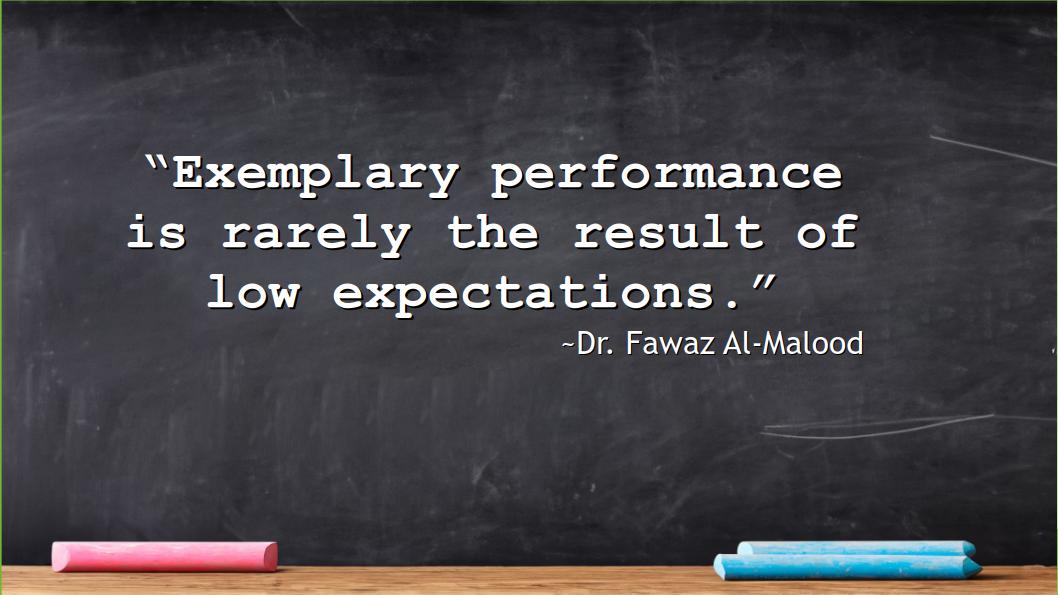Articles for higher education professionals and aspiring professionals.

Exemplary Performance Quote
I was blessed and fortunate enough to have attended an exclusive small private college in Switzerland on a full-academic scholarship. Most of the students who attended came from privileged backgrounds. Many were high-performing students, which was probably a good thing because this college was no walk in the park. This was one of the top five Hotel Management schools in Switzerland at the time. Academic standards and performance expectations were extremely high. This was a school that had rules and expectations for everything in and out of the classroom. It was more like an elite military academy than a college.
(more…)
As a the head of the hospitality management program at my college, I get contacted by various community organizations, profit and non-profit, looking for students to volunteer for a number of things ranging for being ushers at a major international event like the Breeders Cup World Championships to being Food Safety Advisors at the International Festival at the Claremont Colleges.
As exciting as these opportunities are for me to share with my students, I need to bear in mind that many students are not immediately aware of the benefits of volunteering. Many of my students are commuter students, some have jobs, some are parents and all of them seem to have little to no time to serve the community and volunteer in anyway. Or do they?
(more…)

Photo by C k
I have yet to come across a college or university that requires all students to take a course in time management before they graduate. It’s mind boggling! We in the United States require our students to take a whole bunch of General Education (GE) courses that they’ll rarely, if ever, use after they graduate, but we won’t require them take courses on topics that they will need and benefit from every day of their life during and after college. Courses like: money management, personal financing, and time management. Some of these students eventually become professors never having learned how to manage their time effectively.
I meet a lot of faculty who want to get a lot of things done. They want to accomplish great things in academia but find themselves working around the clock and barely accomplishing anything. They’re able to meet the basic obligations of their duties and nothing more. Why is it that some faculty seem to be involved in so many exciting activities and projects, in addition to teaching, while others are barely keeping their heads above water?
(more…)

Photo by William Fortunato
Ever wonder why so many students hate group work? If you were like most students in college, the thought of group work was something you did not look forward to either. Why? Well, there are a number of reasons.
Being in a group meant:
- making concessions and giving up control of a portion of a project or assignment
- having the performance of other students in the group affect your grade
- being possibly stuck with one or more losers who never do any work and still end up with the same grade as everyone else in the group
- having to rearrange your schedule to accommodate the availability of others in the group
(more…)

Photo by Kampus Production
So you’ve assigned your first group project and thoroughly explained the requirements to your students and you now want to make sure that your students are productive and efficient. Fortunately, there are a few things that you can do to facilitate the interaction and progress of each group.
1. Raise The Bar
Before assigning the groups, it’s important to set the tone for the quality of work you expect from students. Raise the bar high, and your students will meet it and possibly exceed it. Set the bar too low, and you’ll be disappointed with the quality of your students’ work, and they’ll never really know what they are truly capable of achieving. Never make the mistake of assuming that a student’s socio-economic background, age, or cultural background will prevent them from achieving spectacular results if they are properly trained and prepared by you.
(more…)

Photo by Andrea Piacquadio
Every now and then you'll find yourself in a position where you'll need to address unacceptable behavior on the part of one of your students. Some of these behaviors include: cheating, plagiarism, sleeping…

Photo by Vlada Karpovich
One of the challenges that faculty teaching online (or hybrid) courses face is designing their courses so that there’s frequent and active engagement between the student and faculty and also between the students themselves. Why? Because as a faculty, you are required to be able to afford the same level of engagement online that you would in a traditional class where students meet with you and each other in person.
Some faculty are under the false assumption that teaching online is easy, and all you have to do is tell students what you want them to read or study and then have them complete assignments and quizzes to demonstrate their competency or mastery of the learning objectives. That is NOT teaching! Nor does it qualify as a distance learning course that would be eligible to pass the scrutiny of your regional accrediting body. That format may qualify as a correspondence course but not for a distance learning course.
(more…)

Photo by Михаил Крамор
There are numerous articles on the internet that address this issue, and some are better than others. The tips I am about to share with you are strategies that have worked for me, and I hope they’ll work for you as well. I’ve found that most student-related-problems fall into two broad categories: 1) behavioral problems and 2) academic performance. Most of the behavioral problems can be mitigated before they even start in your classroom. How?
I’m glad you asked! In a nutshell, “Nip it in the bud!” Take action from the very beginning, and address potential areas of concern before they even occur.
Here are 3 ways to do just that!
(more…)

Photo by Pixabay
Planning a course for a brand new faculty can be an overwhelming experience. It can be especially overwhelming if this is your first time going through the process. And even more so if you have not had the opportunity to participate in a TA program and be mentored by seasoned faculty. But, there’s no reason to fret. This article will cover a few simple things you can do to help you plan your first course without stressing and getting overwhelmed.
(more…)









